Bitcoin
MicroStrategy to Sell $2 Billion in Stock to Buy More Bitcoin
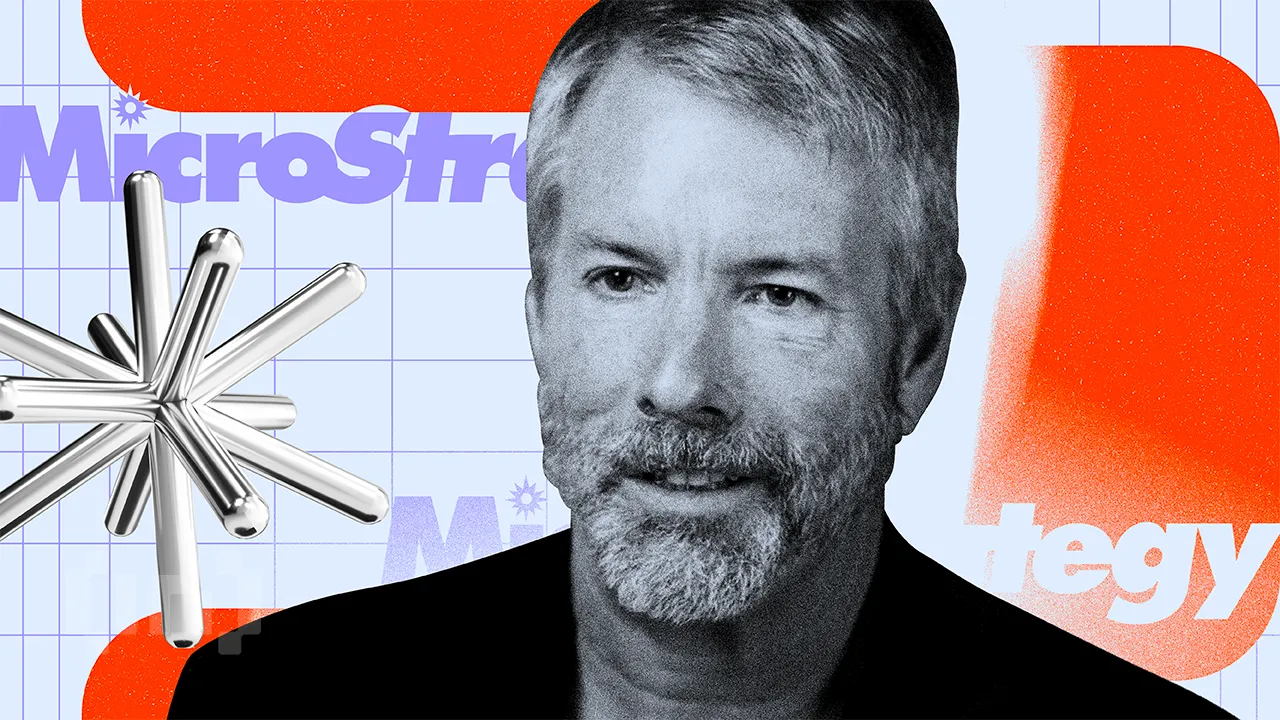
Strategy (formerly MicroStrategy) is conducting a private offering of convertible senior notes. The firm will offer $2 billion of these assets and use the proceeds to buy more Bitcoin.
Saylor announced that his firm had not bought any Bitcoin in the last week, further interrupting his purchasing trend. Still, other than this detail, everything else seems to fit within his standard acquisition playbook.
Strategy Keeps Buying Bitcoin
Since MicroStrategy (recently rebranded to Strategy) began acquiring Bitcoin, it’s become one of the world’s largest BTC holders. Earlier this month, the firm broke its 12-week streak of consecutive purchases, quickly resuming it shortly afterward.
Today, Michael Saylor acknowledged that the company paused its purchases again, but not for long:
“Last week, Strategy did not sell any shares of class A common stock under its at-the-market equity offering program, and did not purchase any bitcoin. As of 2/17/2025, we hold 478,740 BTC acquired for ~$31.1 billion at ~$65,033 per bitcoin,” Saylor claimed.
Specifically, a few hours after Saylor made this first post, he followed it up with another announcement. The company is planning to privately offer $2 billion worth of convertible senior notes.
These stock offerings, of course, will help Strategy fund more Bitcoin purchases. This is an established technique for the company, making a similar offering last month.
Strategy has employed a few different tactics to continue these major Bitcoin acquisitions. It sold enough stock that BlackRock now owns 5% of the company, and its Strike Preferred Stock (STRK) has been a strong performer. The company’s formidable BTC stockpile has significantly appreciated in value, but the company is strictly holding these assets.
The price of Bitcoin has been somewhat wobbly over the past few weeks, which may present an opportunity for Strategy. After striking ups and downs, its price is consolidating just under the $100,000 mark. This isn’t much of a price decline in the grand scheme, but it will still help Strategy get more assets for the same investment.

Meanwhile, MSTR’s stock price has also underperformed recently. It remains down by nearly 15% in the past month.
Ultimately, this whole operation seems pretty by the book. Strategy has clearly telegraphed its intentions to buy more Bitcoin with this stock sale, just like several other recent offerings.
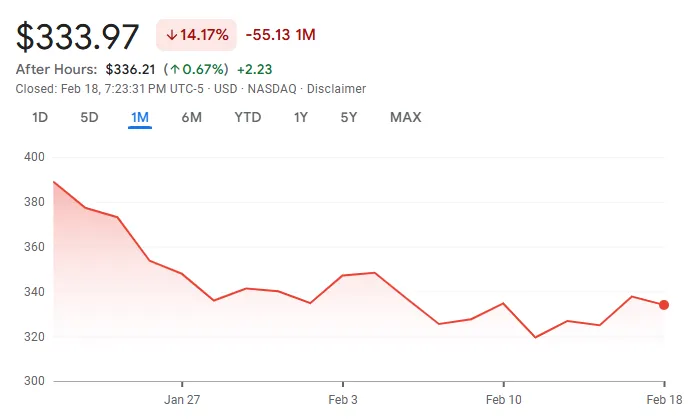
Although there have been rumors that the firm may face difficulties fulfilling this strategy, they haven’t surfaced yet. For now, Saylor seems content with the same outlook – maximalist bullishness.
Disclaimer
In adherence to the Trust Project guidelines, BeInCrypto is committed to unbiased, transparent reporting. This news article aims to provide accurate, timely information. However, readers are advised to verify facts independently and consult with a professional before making any decisions based on this content. Please note that our Terms and Conditions, Privacy Policy, and Disclaimers have been updated.
Bitcoin
US Economic Indicators to Watch & Potential Impact on Bitcoin

Several US economic indicators are in the pipeline this week, with potential implications for Bitcoin and crypto.
US macroeconomic data have broadly influenced sentiment in the cryptocurrency market over the past several months. Therefore, it is imperative that traders and investors adjust their portfolios and align their trading strategies to capitalize on key economic events.
US Economic Events This Week
Several factors, including macroeconomic sentiment, monetary policy expectations, and Bitcoin’s growing narrative as a hedge or risk asset, influence Bitcoin’s price dynamics. These make the following indicators particularly relevant this week.
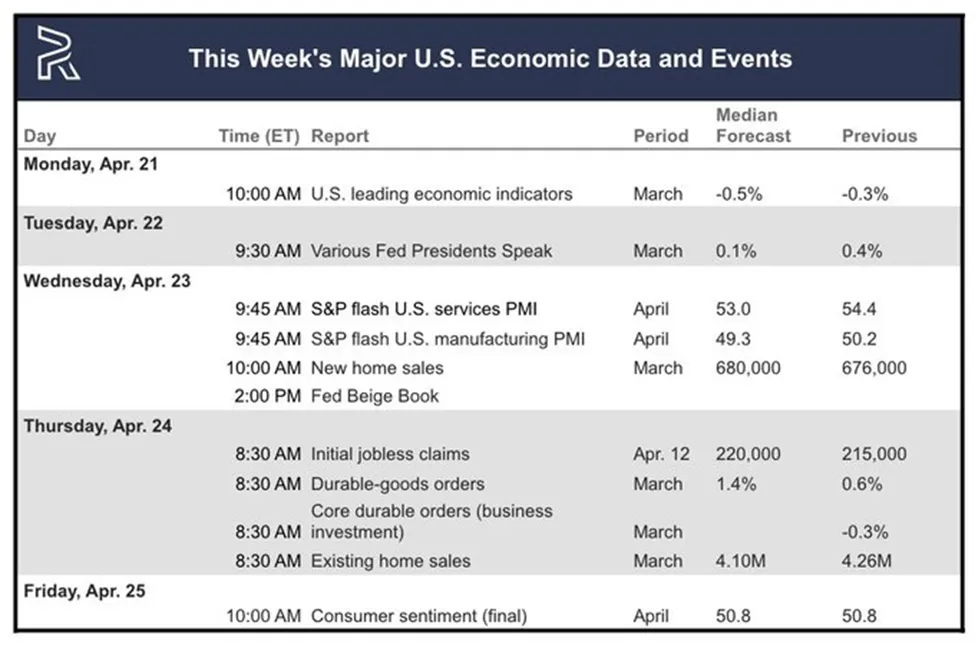
US Leading Economic Indicators
The first US economic indicator that could influence Bitcoin price is March’s leading economic indicator, due today, Monday, April 21.
The Conference Board Leading Economic Index (LEI), last reported for February 2025, declined by 0.3% month-over-month (MoM) after a revised 0.1% increase in December 2024.
This drop, driven by pessimistic consumer expectations and weaker manufacturing orders, continued a trend of negative signals. However, the six-month growth rate is improving, suggesting less severe headwinds than in 2024.
There is a median forecast of a 0.5% decline for the March report, versus a consensus of -0.6%. While these data points to economic slowdown, stabilizing trends and a projected 2.0% GDP growth for 2025 offer some optimism.
However, policy uncertainties, such as Trump’s tariffs, could exacerbate risks. For Bitcoin, declining LEI may dampen risk appetite, pushing investors toward safer assets like bonds and pressuring prices in the short term.
Conversely, Bitcoin’s “digital gold” narrative could gain traction if economic uncertainty fuels distrust in fiat systems. However, this is less likely unless broader trade tensions or policy shocks amplify the effect.
Services PMI
The S&P Global US Services PMI for March 2025 climbed to 54.4 from 51.0 in February, signaling strong expansion in the services sector. This rise, paired with a composite PMI 53.5, reflects resilient consumer demand.
This strength bolsters the US dollar, reducing expectations for Federal Reserve (Fed) rate cuts, which could challenge Bitcoin’s appeal. A stronger dollar and higher yields typically weigh on Bitcoin, as seen in past cycles when real yields rise.
However, rising input costs and tariff concerns temper business confidence. For the April Services PMI, the median forecast is 53.0.
Strong services activity may support broader risk-on sentiment, potentially lifting Bitcoin if equity markets rally, given its occasional correlation with indices like the Nasdaq.
Still, tariff uncertainties could cap any negative pressure, keeping the impact neutral to slightly bearish, as dollar strength overshadows marginal risk-on gains.
Manufacturing PMI
In contrast, the S&P Global US Manufacturing PMI for March 2025 fell to 50.2 from 52.7, hovering near stagnation. Meanwhile, the ISM Manufacturing PMI contracted to 49.0 from 50.3, with new orders, production, and employment declines.
This weakness, consistent with October 2024’s ISM reading 46.5, reflects high interest rates, weak global demand, and tariff-related uncertainty.
Moody’s Analytics and Statista highlight manufacturing’s struggles, warning of broader slowdown risks, especially with trade policy volatility under the Trump administration.
For Bitcoin, weak manufacturing data signals reduced risk appetite, likely exerting downward pressure, particularly given its equity market correlation.
While a sharp manufacturing decline could theoretically spur rate-cut expectations, persistent inflation and tariff-driven cost pressures make this unlikely. The outlook here is bearish, as fears of economic slowdown dominate.
“S&P Global Services/ManufacturingPMI (Wednesday): The pulse of the economy. Watch for a dip or rise in the numbers…it could hint at whether the recovery is running out of gas or shifting into overdrive,” one user remarked.
Initial Jobless Claims
Initial Jobless Claims for the week ending April 19 recorded 215,000, down from 223,000 the week before.
It indicates a slight improvement but still reflects a labor market under pressure, suggesting ongoing challenges. High interest rates, cautious business investment, and uncertainties surrounding tariff policies likely drive this sentiment by eroding employer confidence.
“…66% of Americans expect higher unemployment in the next 12 months, the highest share since the Great Financial Crisis. Such sharp spikes have never occurred outside of recessions. The job market is set to get worse pretty quickly,” one analyst noted recently.
Nevertheless, despite reduced hiring and economic pressures, the decline suggests some layoff stabilization.
Analysts note that lower claims could ease concerns about rapid deterioration, persistent inflation, and policy uncertainties, which limit expectations for Fed rate cuts.
Meanwhile, jobless claims are a critical driver of Bitcoin sentiment. The modest drop in claims may temper economic weakness signals. If claims continue to decline significantly, sparking hopes of monetary easing, Bitcoin could benefit from increased liquidity and lower yields.
Consumer Sentiment
Consumer Sentiment, as measured by the University of Michigan’s index, was 50.8 in March 2025. This was a modest drop from February’s reading, reflecting tariff-related pessimism and inflation fears despite solid economic conditions.
Preliminary March data suggests a reading of 50.8, with sentiment still sour, per TradingEconomics estimates.
“US consumer sentiment is lower than in the great financial crisis. Consumer sentiment fell to 50.8, the 2nd-lowest level in history. The sentiment is lower than during every US recession over the last 50 years…This is a crisis,” a global markets investor noted.
Consumer sentiment is a gauge of retail investor confidence, critical for Bitcoin’s retail-driven market. Lower sentiment could sap enthusiasm for speculative assets, pushing Bitcoin lower, especially if risk-off sentiment dominates.
Conversely, if sentiment stabilizes or tariff fears ease, Bitcoin could ride a risk-on wave, though this seems unlikely given current trends.
The probable effect is bearish, as declining confidence aligns with broader economic caution.
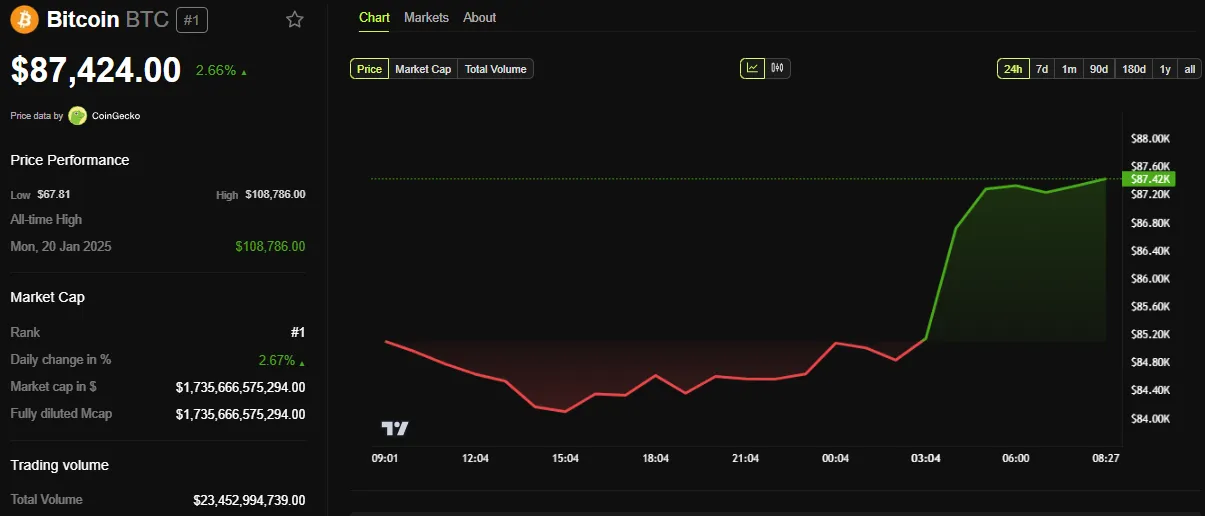
BeInCrypto data shows Bitcoin (BTC) was trading for $87,424 as of this writing. This represents a modest 2.66% gain in the last 24 hours.
Disclaimer
In adherence to the Trust Project guidelines, BeInCrypto is committed to unbiased, transparent reporting. This news article aims to provide accurate, timely information. However, readers are advised to verify facts independently and consult with a professional before making any decisions based on this content. Please note that our Terms and Conditions, Privacy Policy, and Disclaimers have been updated.
Bitcoin
Here Are The Bitcoin Levels To Watch For The Short Term


Bitcoin has produced a range-bound movement recently, with prices oscillating between $83,000 and 86,000. Interestingly, popular crypto analyst Burak Kesmeci has identified the important price levels for any short-term action.
Support At 82,800, Resistance At 92,000 – But Where Is Bitcoin Headed?
In a new post on X, Kesmeci shared an interesting on-chain analysis of the Bitcoin market. Using the short-term investor cost basis, the analyst identified two key price levels that could prove critical to Bitcoin’s next major move.
Firstly, Burak Kesmeci focuses on the average cost prices of new traders over the past 1-4 weeks, which are likely the most reactive to price changes. The realized price for these traders currently stands at $82,800, forming a near-term support that indicates many recent buyers are still in profit and may defend this level as a psychological floor.
Meanwhile, Kesmeci also highlights the $92,000 price level, which marks the average cost basis for BTC holders for 1-3 months. This price point has emerged as an important resistance zone, as investors are likely to exit the market once they break even. Furthermore, the $92,000 price level is also marked by a confluence with various technical indicators.
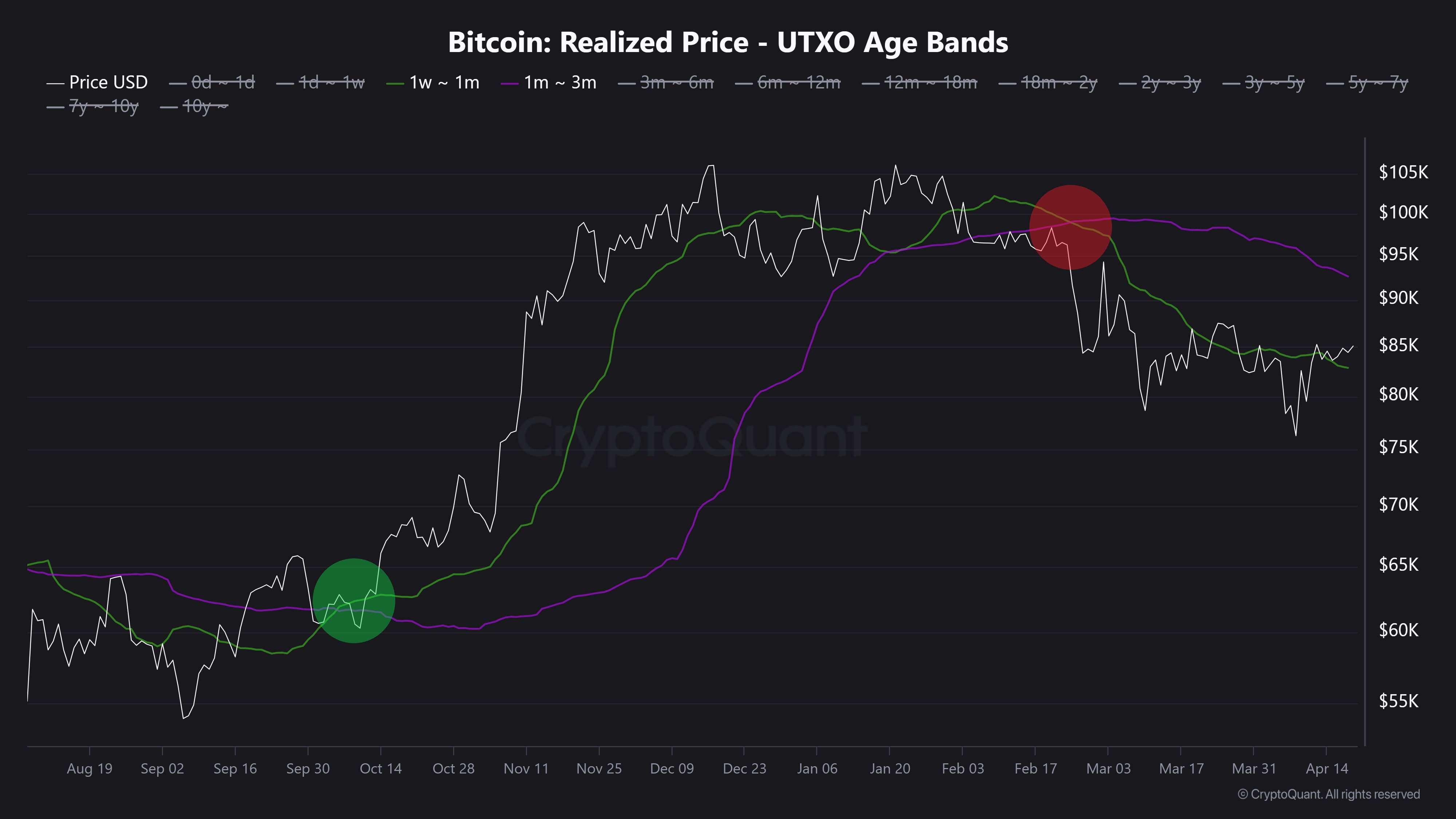
The interplay between these two levels is significant. Historically, short-term bullish trends in BTC tend to begin when the cost basis of more recent investors, 1–4 weeks, crosses above that of the 1–3 BTC holders. This shift signals increased confidence and willingness to buy at higher levels, which often fuels broader rallies.
However, that dynamic remains to play out in the current market. As of now, Bitcoin is trading around 85,000, positioning it above its support at the 1–4 week average of $82,800 but still below the 1–3 month resistance of $92,000. Furthermore, both cost basis levels have been declining over the past two months, reflecting hesitation or a lack of aggressive buying from new entrants.
Notably, Kesmeci states that BTC must surge above $92,000 to confirm a strong bullish momentum for a price reversal.
Bitcoin ETFs Offload 1,725 BTC
In other news, Ali Martinez reports that the Bitcoin ETFs have suffered withdrawals of 1,725 Bitcoin, valued at $146.92 million, over the past week. This development illustrates a high level of negative sentiment among institutional investors, adding to market uncertainty around the BTC market.
Meanwhile, Bitcoin trades at $85,249 following a price change of 0.89% in the past day. The premier cryptocurrency also reflects a 0.58% loss on the weekly chart and a 1.06% gain on a monthly chart.
Feature image from Adobe Stock, chart from Tradingview

Editorial Process for bitcoinist is centered on delivering thoroughly researched, accurate, and unbiased content. We uphold strict sourcing standards, and each page undergoes diligent review by our team of top technology experts and seasoned editors. This process ensures the integrity, relevance, and value of our content for our readers.
Bitcoin
Bitcoin LTH Selling Pressure Hits Yearly Low — Bull Market Ready For Take Off?


Following an extensive price correction in the past three months, the Bitcoin bull market continues to hang in the balance. Despite a modest price rebound in April, the premier cryptocurrency is yet to display a strong intent to resume its bull rally amidst a lack of positive market factors. However, crypto analyst Axel Adler Jr. has highlighted a promising development that could signal major upside potential for Bitcoin.
Bitcoin Long-Term Holders Looking To Halt Selling Pressure
In a recent post on X, Adler Jr. shared an important update in Bitcoin long-term holders (LTH) activity, which could prove significantly positive for the broader BTC market.
Using on-chain data from CryptoQuant, the renowned analyst reports that selling pressure by long-term holders, i.e. amount of LTH holdings on exchanges, has now hit its lowest point at 1.1% over the past year. This development indicates that Bitcoin LTH are now opting to hold on to their assets rather than take profits.
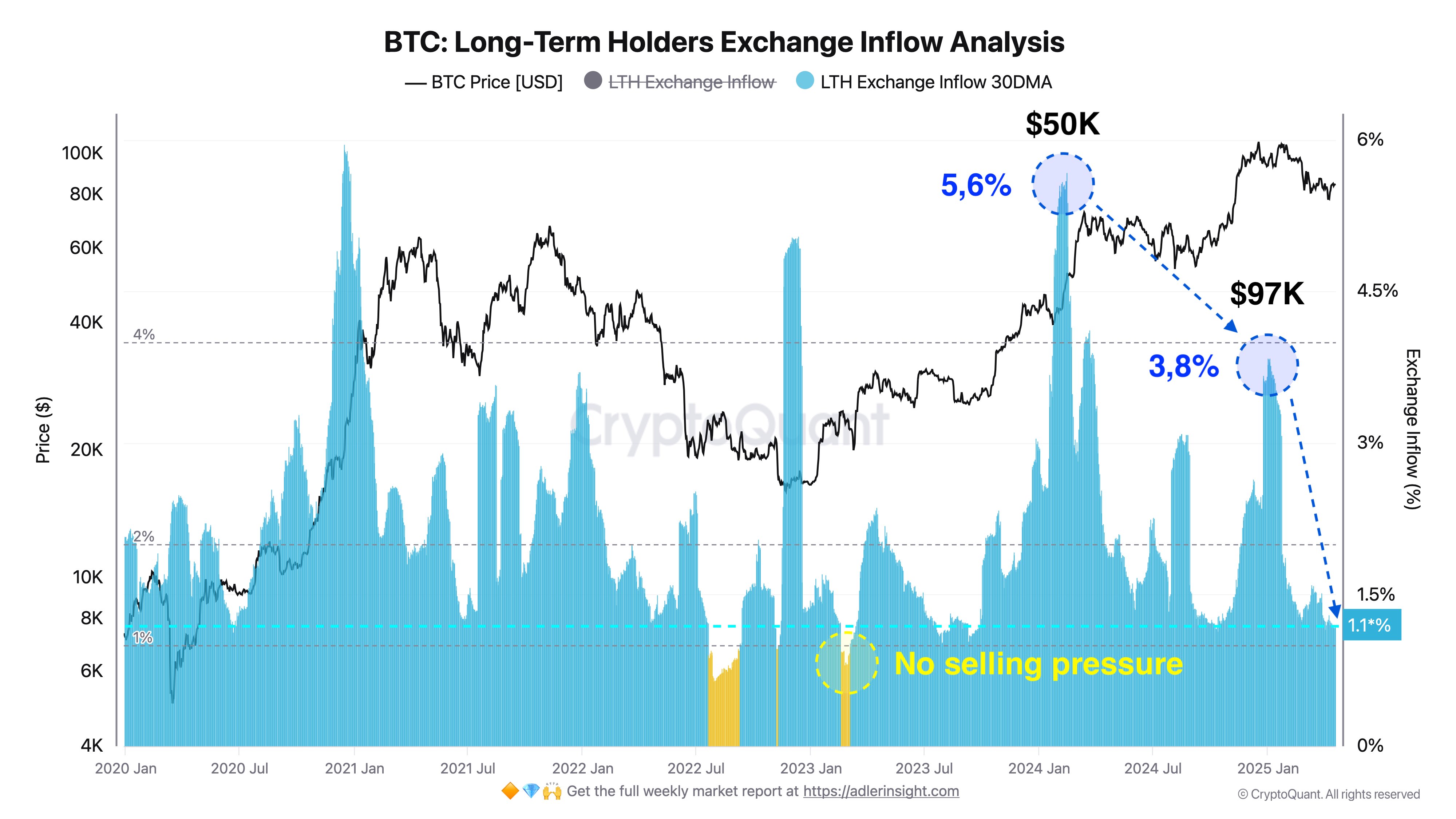
Adler explains that a further decline in these LTH exchange holdings to 1.0% would signal the total absence of selling pressure. Notably, this development could encourage new market entry and sustained accumulation, creating a strong bullish momentum in the BTC market.
Importantly, Alder highlights that the majority of the Bitcoin LTH entered the market at an average price of $25,000, Since then, CryptoQuant has recorded the highest LTH selling pressure of 5.6% at $50,000 in early 2024 and 3.8% at $97,000 in early 2025.
According to Adler, these two instances likely represent the primary profit-taking phases for long-term holders who intended to exit the market. Therefore, a resurgence in selling pressure from this cohort of BTC investors is unlikely in the short-term, which supports a building bullish case as long-term holders currently control 77.5% of Bitcoin in circulation.
BTC Price Overview
At the time of writing, Bitcoin was trading at $85,226 following a 0.36% gain in the past day and a 0.02% loss in the past week. Both metrics only reflect the ongoing market consolidation as BTC continues to struggle to achieve a convincing price breakout beyond $86,000.
Meanwhile, the asset’s performance on the monthly chat now reflects a 1.97% gain, indicating a potential trend reversal as the market correction ceases. Nevertheless, BTC remains in need of a strong market catalyst to ignite any sustainable price rally. With a market cap of $1.67 trillion, Bitcoin is ranked as the largest digital asset, controlling 62.9% of the crypto market.
Featured image from Adobe Stock, chart from Tradingview

Editorial Process for bitcoinist is centered on delivering thoroughly researched, accurate, and unbiased content. We uphold strict sourcing standards, and each page undergoes diligent review by our team of top technology experts and seasoned editors. This process ensures the integrity, relevance, and value of our content for our readers.
-

 Market15 hours ago
Market15 hours ago1 Year After Bitcoin Halving: What’s Different This Time?
-

 Ethereum22 hours ago
Ethereum22 hours agoEthereum Consolidates In Symmetrical Triangle: Expert Predicts 17% Price Move
-

 Market21 hours ago
Market21 hours agoToday’s $1K XRP Bag May Become Tomorrow’s Jackpot, Crypto Founder Says
-

 Market19 hours ago
Market19 hours agoMELANIA Crashes to All-Time Low Amid Insiders Continued Sales
-

 Market20 hours ago
Market20 hours agoCharles Schwab Plans Spot Crypto Trading Rollout in 2026
-

 Market16 hours ago
Market16 hours agoVOXEL Climbs 200% After Suspected Bitget Bot Glitch
-

 Ethereum24 hours ago
Ethereum24 hours agoEthereum Accumulators At A Crucial Moment: ETH Realized Price Tests Make-Or-Break Point
-

 Ethereum21 hours ago
Ethereum21 hours agoEthereum Enters Historic Buy Zone As Price Dips Below Key Level – Insights

















